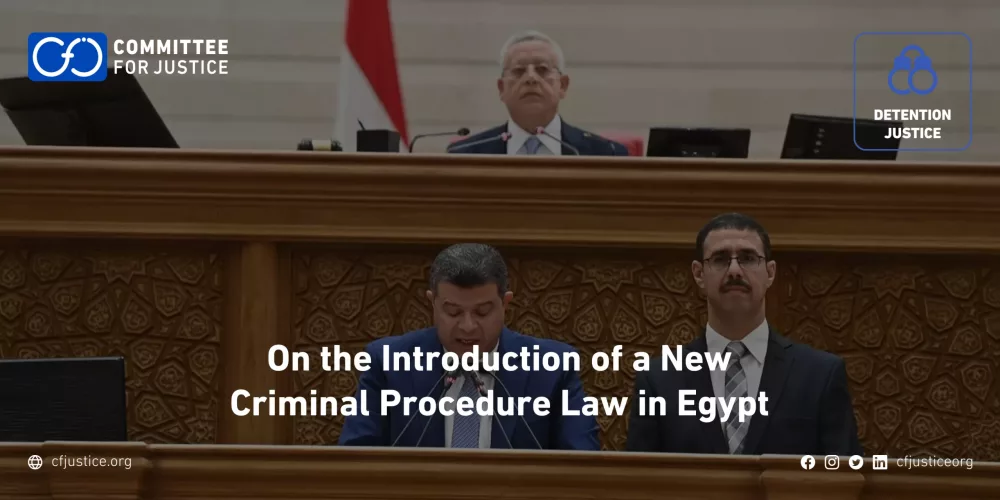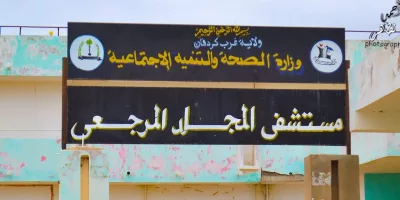The report by the Committee for Justice (CFJ) on the proposed amendments to Egypt’s Criminal Procedure Law aims to promote justice and protect the rights of those deprived of their basic human freedom, based on human rights principles and fair trial guarantees. This comes within CFJ’s role of monitoring and analyzing legislation that affects individuals’ lives and freedoms, while drawing attention to potential violations that may arise from the implementation of such laws.
The proposed amendments, submitted to the Egyptian Parliament, include significant changes to the Criminal Procedure Law enacted in 1950, which is the legal foundation for regulating criminal cases in Egypt. The new draft law comprises six main books covering topics such as criminal prosecution, evidence collection, courts, appeals, enforcement, and international judicial cooperation in criminal matters, consisting of 540 articles in total.
CFJ clarified that certain articles of the draft law conflict with international standards that guarantee defendants’ rights and fair trials. These include the Universal Declaration of Human Rights and the International Covenant on Civil and Political Rights, both of which ensure the right to a fair trial and the right to defense. The report also referenced the set of principles related to the protection of individuals deprived of their freedom, which asserts the right of detainees to receive legal assistance from lawyers and communicate with them.
However, despite the comprehensive nature of these amendments, CFJ expressed numerous reservations about certain proposed provisions, which it believes could negatively impact justice guarantees and restrict the fundamental rights of defendants and lawyers alike.
Among the main concerns and reservations:
1- Pretrial detention:
CFJ highlighted the ongoing issue of prolonged pretrial detention in Egypt, where judicial authorities ignore existing laws that limit the duration of pretrial detention, especially in criminal cases, which should not exceed two years. However, CFJ notes that this law is not adequately enforced, as authorities circumvent the law by recharging detainees with similar accusations after the expiration of the pretrial detention period, thereby extending their detention without trial. CFJ believes that amending the law should not only focus on the legal texts but must also enforce strict adherence to these regulations to ensure the protection of rights.
2- Legal representation and the right to defense:
CFJ expressed grave concerns over certain provisions that restrict lawyers’ right to defense. For instance, the proposed law does not require the presence of a lawyer during the interrogation of the accused in certain cases, and it does not allow lawyers full access to case documents. Additionally, the law grants the prosecution wide powers to withhold information from the lawyer, posing a threat to defense rights and undermining the principle of a fair trial. One of the most troubling aspects is the prosecution’s authority to prevent lawyers from speaking during sessions without clear standards.
3- Hearing procedures and trials in absentia:
Some proposed provisions allow for judgments issued in absentia to be considered as if the accused were present, based on non-traditional notification methods such as mobile phone or email. CFJ believes that these methods do not guarantee the accused’s actual awareness of the trial date, which results in depriving them of their right to defense and appeal. Moreover, it denies the accused the opportunity to benefit from different levels of litigation. CFJ noted that this amendment contradicts the presumption of innocence principle.
4- Remote trials:
CFJ also expressed reservations about the provisions allowing for remote trials using modern technology. CFJ believes that this approach is inappropriate for criminal cases, which require the accused to be physically present before the judge to form a proper conviction regarding the charges. Additionally, lawyers may find themselves forced to be present in detention facilities, complicating the practice of defense rights and narrowing the scope of lawyers’ work.
5- Torture and enforced disappearance cases:
CFJ observed that the legal provisions concerning the accountability of judicial officers in cases of torture and enforced disappearance do not include sufficient guarantees to hold them accountable. These provisions prevent the victim or their family from directly initiating criminal proceedings against police officers, leaving the matter to the prosecutor general. CFJ believes that this law fosters a culture of impunity and weakens the mechanisms of legal accountability.
6- Concealing the identity of witnesses:
One of the concerning provisions in the draft law is the allowance for the concealment of a witness’s identity and withholding their details. CFJ views this measure as contrary to the principles of justice, as judgments in criminal cases could be based on testimonies from anonymous individuals. This poses a risk to the guarantees of a fair trial and weakens the accused’s ability to defend themselves.
7- Expansion of court powers:
CFJ pointed out that some provisions excessively expand the court’s powers, such as granting the court the right to initiate criminal proceedings for any act occurring outside the courtroom that the court deems to have influenced its judges or witnesses. CFJ believes these provisions are vague and lack precise criteria for determining what constitutes actions that influence the court, which could lead to abuse of these powers.
8- Settlement in public funds crimes:
CFJ criticized the provisions that allow for settlements in crimes related to the misappropriation of public funds. It believes that these provisions open the door to the exploitation of influence and corruption, as they enable defendants to commit financial crimes and then settle afterward, allowing them to evade punishment and weakening the state’s ability to deter such crimes.
CFJ emphasizes in the conclusion of its report that the proposed amendments to the Criminal Procedure Code currently under consideration by the Egyptian Parliament, despite some positive aspects, carry many risks that could undermine the fairness of criminal procedures in Egypt and equality before the law. CFJ believes that if these amendments are not thoroughly reviewed, they could contribute to the deterioration of human rights in Egypt and erode the rights of defendants. Therefore, CFJ calls for a broad societal dialogue involving all relevant stakeholders to ensure that any amendments to this law align with the principles of human rights and comprehensive justice.
CFJ also recommended that authorities be mandated to enforce legal provisions related to pretrial detention and to refrain from exceeding the legally stipulated detention periods. It called for the strengthening of defense rights by ensuring the presence of lawyers at all stages of the investigation and granting them full access to case files, allowing them to defend their clients without restrictions.
Additionally, CFJ urged a reconsideration of the provisions concerning trials in absentia and the abolition of those that allow for remote trials. It also called on the Egyptian authorities to enhance accountability mechanisms in cases of torture and enforced disappearance, and to review the provisions related to settlements in crimes involving public funds to ensure effective anti-corruption measures.






